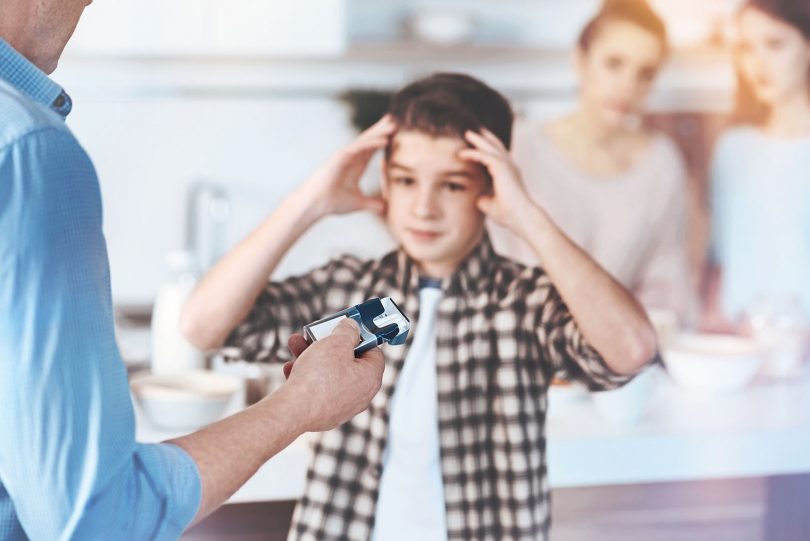If your gut reaction is to freak out after learning that your child is experimenting with smoking, don’t worry.
You’re not alone.
But freaking out is probably not the most effective way to encourage your middle schooler or teen to stop.
And not to freak you out even more, but yes, this is a problem affecting even kids as young as 11 years old. According to the Centers for Disease Control and Prevention, roughly 1 of out every 10 middle schoolers uses some form of tobacco product. In high school, that increases to 1 out of every 5 students. Even more troubling, among current adult smokers, about 90 percent started the behavior when they were kids or teens younger than 18 years old.
So, it’s obvious that to keep your children from growing up to become smokers, it’s up to us as parents to nip it in the bud. Other statistics say that if you can keep someone from smoking until age 26, they are unlikely to ever start—and if you think about it, most of that time is under your roof.
If you find out that your child has been experimenting with tobacco, don’t lecture and don’t nag, but start by asking why he or she finds smoking or tobacco use appealing. Your child may offer any number of reasons as to why he or she decided to try it, but here’s how you can respond.
Your child says: “I want to lose weight.”
You say: “Let’s find a healthier way to do that” (if your child really is overweight).
Although the nicotine in tobacco products has been shown to suppress your appetite, it’s also addictive. The chemical causes the brain to release adrenaline, which can feel good, but your body soon builds up a tolerance to the nicotine, which means you need more and more to have that same buzz. Sounds like a steep price to pay for a little weight loss, doesn’t it? If your child is worried about his or her weight, talk about making more balanced food choices, such as whole grains, fruits and vegetables, and lean protein. Exercise can also cause a release of feel-good adrenaline, and that’s a behavior you can support!
Your child says: “My friends all smoke, and they want me to smoke, too.”
You say: “If you don’t want to smoke, let’s figure out how you can say no.”
Learning how to say no is a valuable skill for any of us. If it’s friends who are pressuring your child to be a part of the group and light up, maybe your child can practice some responses with you. “It just doesn’t make me feel good,” “No, I tried it, and I don’t like the way it tastes,” or “No, I’m just not into that” are some good options. This may also give your child insight as to whether that friend really is a friend. Although disagreements happen, acceptance is an important part of friendship.
Your child says: “I look cool/tough/older.”
You say: “This is how smoking really affects your appearance.”
Scare tactics like showing kids a lung blackened by longtime smoking or talking about dying from cancer at some future date actually aren’t very effective. What is effective is talking about smoking’s immediate effects: yellow teeth, smelly clothes, bad breath, and dried-out, aging skin—none of which are very cool. Also, if your child is an athlete, you can explain how smoking affects lung capacity, which can greatly impact how well he or she may perform on the field.
If there is a history of smoking in your family, sharing an example close to home could also be very persuasive. For example, you can talk about how smoking has affected an uncle’s skin or the lung cancer that a grandparent had to face.
On the other hand, if low self-esteem is causing your child to try to “fit in” by smoking, help your child figure out another hobby that will help build confidence, like sports or the arts. If your child is really struggling with low self-esteem, talking to a therapist might also be a good idea.
Your child says: “What? I’m not smoking.”
You say: “We know you are, and here are the rules about smoking.”
If you know for a fact that your child is smoking and refuses to quit—or is trying to hide it from you—it’s time to get serious about rules. Do you give your child an allowance? Stop the funds now so he or she won’t be able to afford the cigarettes or other tobacco products. Establish clear rules such as “no smoking in the house” and “no smoking in the car.” If rules are broken, there should be consequences just as there would be for any other rule. For instance, children will have to come straight home from school, and you’ll be smelling their breath when they arrive.
You can also assign your child a research project about smoking and its consequences. Maybe it can double as a science project or paper for school or can just be “extra credit” for home, but it will force your child to learn about the negative consequences of smoking, versus just hearing it from you.
Your child says: “I’ve set a quit date.”
You say: “I’m so proud of you.”
On the flip side, if your child wants to quit, be positive and encouraging. Help your child establish a quit date if she or he hasn’t already, and talk to your pediatrician about any local groups or programs that could help. You can also sign your teen up for SmokefreeTXT for Teens, available at www.smokefree.gov, which will send your teen three to five text messages a day to encourage him or her to stick to smoke-free goals. At home, use positive reinforcement, like movie nights or a new outfit, and praise when your child achieves these goals.
A little about e-cigarettes
Say your child isn’t smoking per se but is instead choosing to “vape” or “JUUL,” slang words for e-cigarettes. Hey, it’s better than smoking, right?
Actually, not really. Most brands of e-cigarettes still contain nicotine, as well as a host of other chemicals that research hasn’t been able to show is safe to breathe. The U.S. Food and Drug Administration and the CDC both say that the devices have potential health risks. Plus, letting your child use a device that mimics smoking—even if it were found to be safer—only encourages the behavior.
Do what you can to keep kids from smoking
Because smoking has such significant health consequences, don’t make it easy for them. But, no matter what you say or how you say it, make sure you always are saying it out of love and worry about your child’s health—and make sure your child knows that. Ultimately, it is your child’s choice, but talking through the issues and the negative impact of smoking can help keep your child from adopting a potentially lifelong—and incredibly harmful—behavior.




